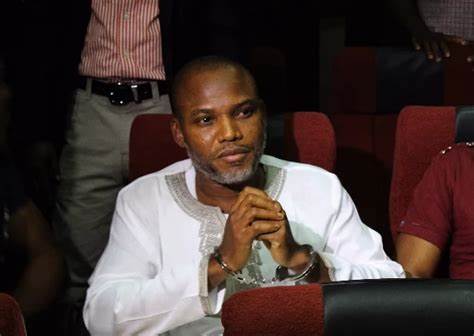Nnamdi Kanu, the detained leader of the Indigenous People of Biafra (IPOB), has called for his case to be transferred to a Federal High Court in the Southeast if judges in Abuja are unwilling to preside over it.
The request was disclosed by Kanu’s special counsel, Aloy Ejimakor, in a statement following a visit to Kanu at the State Security Service (SSS) facility. Kanu, who faces terrorism charges, has been in detention since June 2021 after being controversially repatriated from Kenya.
Kanu’s legal team has repeatedly opposed the current presiding judge, Justice Binta Nyako, accusing her of bias and failing to comply with a Supreme Court ruling that ordered Kanu’s release on bail. In September 2024, Justice Nyako recused herself from the case, but the Chief Judge of the Federal High Court, John Tsoho, later reassigned the case back to her, sparking further resistance from Kanu’s team.
Speaking on Kanu’s concerns, Ejimakor stated, “Mazi Nnamdi Kanu has instructed us to ensure that Justice Nyako does not continue presiding over his trial. Allowing her to do so would mean disobedience to her own order of recusal.”
Kanu has now requested that the case be transferred to a Federal High Court in the Southeast or South-south regions, naming Umuahia, Awka, Enugu, Asaba, or Port Harcourt as possible locations. Ejimakor emphasized the constitutional implications of the ongoing judicial conflicts.
In October 2022, the Court of Appeal in Abuja ruled that Kanu’s extraordinary rendition from Kenya violated Nigeria’s extradition treaty and his fundamental human rights. The court dismissed the terrorism charges against him and ordered his release. However, the federal government refused to comply, citing security concerns in the Southeast.
In December 2023, the Supreme Court reversed the lower court’s decision, directing that Kanu’s trial continue at the Federal High Court in Abuja. This decision reignited controversy, particularly over Justice Nyako’s reassignment to the case.
Ejimakor reiterated Kanu’s stance on transferring the trial, saying, “If judges in Abuja are unwilling to hear the case, it should be moved to a court in the Southeast where justice can be fairly administered.”
The situation remains tense as Kanu’s legal team continues to challenge the judiciary’s handling of the case, accusing the government of disregarding due process and constitutional provisions.

















